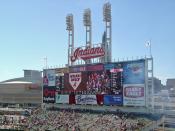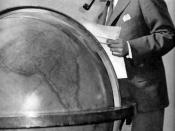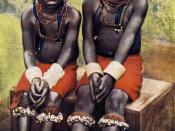In my opinion, history has played a tremendous part in bringing the economy to what it is today. New and creative ideas were adapted to, while the old ideas were replaced. Actually, some of the old ideas are still use in the modern economic society today. Although we did evolve in our economy, the primitive society still exists in the modern society. An example of a primitive society in today's times is the economy of our homes. Most homes only consider its immediate family as the only ones to care for. Well, I say that's not true. In other western countries around the world, people still have the obligations to support relatives. One example of this is that a family can only afford to send one child to school. That child goes to school while all the other family members work. Then that one child gets a degree, gets a decent job and is making some money.
It is only out of obligation that you help out your family to get the others to school and on track to lead better lives. To help your children support their own families until they are able to handle themselves on their own. The primitive economy is not fully replaced but has changed to what it is today.
One may wonder how did this happen. How come our whole economy was based on family and underlying traditional lines and how did it change? I believed it all started when the white man came to North America and met the native Indians. The white men showed the Indians things they have never seen before, such as metal pots and guns. These were things that would greatly help the Indians in their way of life. This new technology impressed the Indians. Just by this, the primitive society has just started to move into a more market economy. Just by having the metal pots and the new guns, they technology was getting greater and there was no looking back from that point on. One of the reasons why a primitive society was replaced was because of a lack of technology. They also lacked a modern economic organization. The way our economy functions is that the consumer buys the product and then produces a chain reaction. After the product is bought, the store will order more from the manufacturer. The manufacturer will then order the more material to make more products. The material is produced from those who either harvest it or get it from another source. This is the base of our economy. The economy is based on the consumers making money, then spending it. In a primitive economy, trade would take place for the goods that either the French or the English brought from Europe. It's still sounds like the same system. For example, to make the pots they needed material and therefore the material needs to be engineered.
A primitive economy was very personal. There is no competition against the company selling. There was only one source for the consumer to go to. There was no notion of better quality in the goods they were trading for. They traded the number of beaver skins for whatever product they were interested in. This would happen year after year. What the Indians didn't understand was that when they go back, the prices are different then what they were used to. Prices went up or prices went down. The argument was that they were getting the exact same product so that meant the price should stay the same instead of fluxing up or down. This was the start of a company making profit. Selling goods for more than it is actually worth, so they can make a business. There were also those who cannot make it to go trading, so they need the goods brought to them, by someone who has traded them the goods already. What that person would do is make the trip carrying the goods and sell them for a much higher price than what it is worth. Making a profit was soon becoming very popular and was soon becoming a new way of life.
As the population grew, so was the demand of new products and new technology to handle this kind of demand. The population would grow and the number of personal relationships soon became impersonal. It was unheard of to take your trading to someone you didn't even know. In today's market economy, everywhere you go, whatever you buy, most likely the person you are buying from is the first time you have seen that person in your life. Unless you know the person that is working for that certain company. That is a different story, because you could be buying there because they are giving you a special discount. If you have a friend that works for a certain company, you know you would probably get a better deal than someone who works for that same company that you don't know. Not all the time, but sometimes that happens. Technology is now paving the way our economy is going to take us. We are now connected in every way. From electricity, to phone lines. We can call ourselves a global village. We now have the Internet, and new Internet businesses that are rising. Businesses from other countries are now partners with each other and the success of our economy will. Branches of different businesses expand their franchise and try to market it in a different part of the world. For example, the fast food chain McDonalds which has numerous locations around the world. Transportation plays a huge part in our technology today. An example is flying to another city to strike a business deal with another company. To do that, we need air planes to fly. Charging airfare to the passengers also is where the airline companies get their money. Then when there is an issue that arises that scares the people for example, the September 11 attacks; the airline industry is now struggling to hang in. There are now fewer people flying in airplanes because they are scared. More people are staying at home because they are now plugged to their Television set instead of going out and spending money. A lot of factors play a part in today's economy.
Today's economy is based on man's ability to manipulate the system, while the primitive economy was all about fulfilling their obligations to one another, and learning to adapt to whatever nature had in store for them. It was natures call if they were to have a better harvest than usual or have a big drought. Now a days, we try to control the environment of our harvest by spraying chemicals to keep the bugs off, water them with hoses and crop them with big machines. It takes less time to harvest now, then back then. The natives didn't have this technology. They didn't need to because, there was so little of them. Most of the time, they would have enough food to feed everyone. Nature controlled their crops, which sometimes caused devastation for the tribe because they don't have enough food for everyone. They basically did not have the technology to try to prevent this certain thing from happening.
So as you can see through numerous examples, history and how it unfolded itself played a big part in becoming the modern market economy that we are today. Beginning from the French and British arrival to the new land and showing the native Indians the new technology that they have to offer them. How the primitive economy system is still used in today's economy at home, and with anyone who has personal ties to a certain business. It was basically the high demand of products and the growth of technology that pushed the primitive society to a modern society. The growth of population and also how that population was effected had a major influence in the transition. Businesses rely on the consumer. The economy relies on the consumer. The primitive society became out dated and basically needed to be changed. Who knows, the economy that we live in today, might not be the economy of tomorrow. The next question that could be asked is how did we move from a modern market economy to a futuristic global economy? Only time could tell.





